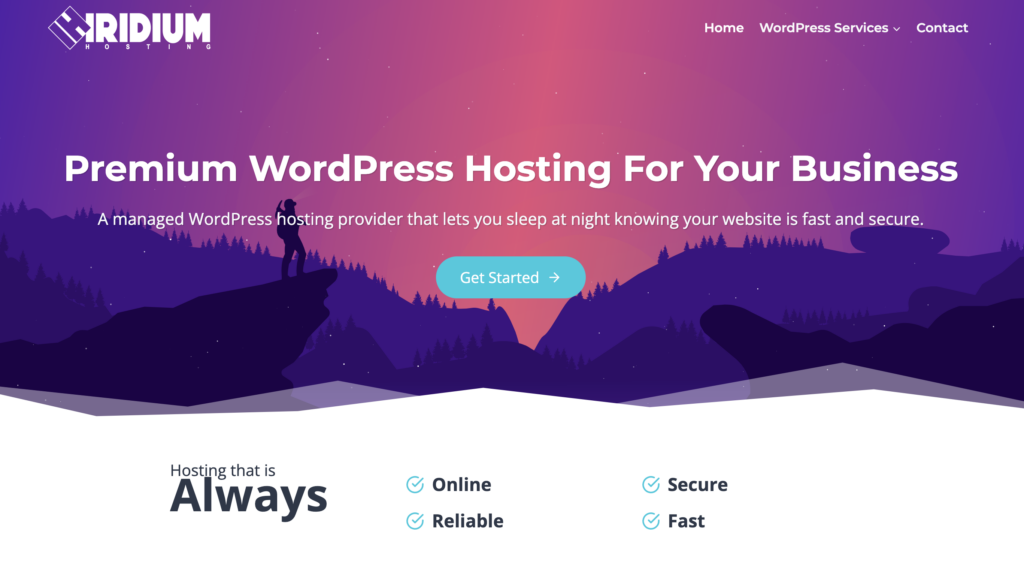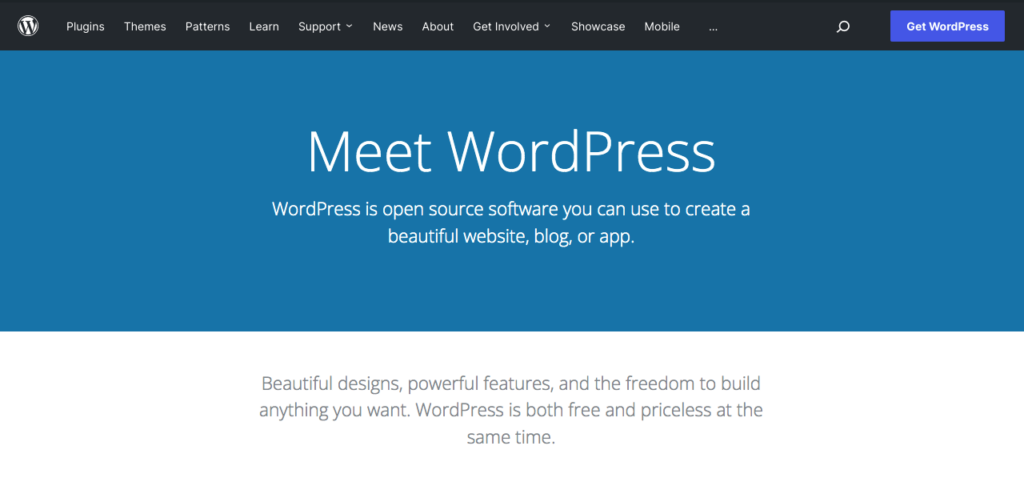4 Great Reasons Why You Should Start a Self-Hosted Blog Today

When you buy something through one of the links on our site, we may earn an affiliate commission.
A self-hosted blog lets you monetize and earn money for your content. Plain and simple.
There are also a couple of other reasons why a self-hosted blog is the best option for bloggers to get started, but if you already have a blog—don't worry. You can still transfer it to a self-hosted platform.
Contents
What is the difference between a hosted and self-hosted blog

If you're new to blogging, you might wonder whether you should use something like Squarespace or Wix to get started.
You can build some pretty stunning websites with these builders. However, these are hosted blogging platforms. This means everything is included in the package that you pay for. They provide the hosting (which is how all your blog files are stored on the Internet), and you can use their software tools to design your website.
There are also free blogging platforms like Tumblr, Blogger, or Wordpress.org, which can be appealing if you want to start your blog without having to pay any upfront costs.
Comparatively, Wordpress.org and other platforms like Drupal or Joopla are self-hosted. You download the software and then are responsible for hosting it yourself and designing your own website.
There are pros and cons to either option, and we'll get into that below, but the main differences between the two for many people come down to cost and the perceived learning curve.
Some hosted options are free, and just about all hosted options hold your hand through the entire setup process. Using the blogging software on many free blogging platforms is extremely simple, but the trade-off is that you are extremely limited (more on that later).
Meanwhile, self-hosted options incur some start-up costs (though don't let that put you off because these can still be very low!) and often require a little bit more know-how to design something that looks good.
There are however hosting services out there like Iridium Hosting that help you self host and even provide WordPress management services!
If you're still trying to decide if blogging is for you, take a look at this list of 25 Compelling Reasons You Should Start a Blog.
4 compelling reasons to choose self-hosted for your blog
Choosing between hosted and self-hosted for your blog really comes down to what your goals are. If you just want to write for the sake of writing, and if someone happens to read it, hey, great, then by all means, a hosted solution is a cheap and easy way to get a new website up quickly and start blogging.
On the other hand, if you want to build an audience for your blog and monetize your content then, ultimately, self-hosted isn't just your best option: it's kind of your only option.
A lot of people compare the two to renting versus owning a house. A hosted option is the same as renting. It basically means it's not really yours. You are borrowing space from the hosting company and must abide by all the regulations your landlords set out.
Your own self-hosted blog is the same as owning a house. You want to knock down the wall between the kitchen and the diner? Go for it. It's yours, and you can do what you want.
Even if you aren't necessarily concerned with money, there are other reasons why a self-hosted blog is a good idea. Plus, starting out self-hosted means that if you decide to monetize in the future, you save yourself the hassle of having to transfer your site.
Here are some of the top reasons to start a self hosted blog.
1. professionalism
The first thing that having your own self hosted blog lends to your website is professionalism. Right off the bat, people (and search engines) will give you more credit if you have your own domain and custom WordPress site that reflects your personal branding.
We've all heard the saying, "You gotta spend money to make money,' and it's true. Free blogging platforms are fine for hobby bloggers, but if you want to look professional and build yourself as an authority on a subject, a free domain just isn't going to hack it.
Getting a Domain
The good news is, it's pretty easy to find a hosting plan that includes a free domain so you don't have to worry about shelling out a load of extra cash for that perk.
For example, Bluehost, a hosting service for self hosted blogs, offers free domain registration, plus one-click WordPress install, 24/7 support and a 30-day money back guarantee.
Self hosted blogs look and feel more professional to your visitors because they can see that you are willing to invest in yourself. Moreover, you can provide a unique experience instead of the cookie cutter templates free blogging platforms offer. And, by taking charge of your branding, you immediately come across as more legit.
Check out this post by Andrew Chen with some great tips on running a professional blog.
2. control
Whenever it comes to taking care of things, or wanting some creative freedom, renting has a lot of drawbacks. You can find yourself constantly frustrated by your landlord's limitations.
The same can be said for using a hosted blogging service. It is impossible to control your own blog when you set it up with a platform like Wix because their limitations completely bind you.
Launching a self-hosted WordPress blog allows you to take control over what your site looks like, it's functionality and how it interacts with search engines and other websites.
Free platforms and even paid hosted platforms don't give you access to your site code. The no-code builders limit your creative and leave you with little room for bespoke solutions.
Having full control of your site when you start writing blog content makes it easy to make any changes down the road. It also means you can capitalize on your content since you can manage your own SEO. And importantly, there is no room for dispute over the ownership of your blog content.
3. Flexibility
Besides being able to control your site, WordPress also offers a decent amount of add-ons in the way of plugins. Using other blogging platforms can limit what software or apps you can integrate into your site.
Comparatively, WordPress has a plugin library of over 55,000 different apps like Link Whisper to help you maximize the potential of your new blog.
Things like e-mail marketing and blog post optimization are all made easier with the help of the numerous plugins you can install to your self hosted WordPress site.
Don't be afraid of the technical aspects of having all this extra flexibility and control. WordPress is notoriously beginner-friendly, which is why I'd recommend WordPress for any new blogger looking to launch a self-hosted blog.
4. Monetization opportunities

Undoubtedly, one of the most attractive things about a free blogging platform like Tumblr is that it's... well, free. If you want to start a new blog to make money, you're likely looking for the cheapest way to do that, and free is the answer.
But there is a reason you don't see bloggers making six figures on a free platform.
Check out the types of blogs that make money, and you'll probably notice that none of them are free blogs. Pretty much any blog that is bringing in a substantial income is going to be self hosted.
That's because you're severely limited in how you can start monetizing your blog on a free platform—if you can at all.
Ultimately, in exchange for all the benefits of a free blog, other blogging platforms will use your blog as their own advertising space. Often, this means that the page with your blog post is already monetized with display ads. Ads that you have no control over, with zero benefits to you. The money from those ads goes back to the web host.
Meanwhile, if you self host you're free to monetize through whatever means. Ads, sponsored content, and even premium memberships are just some of the ways to start making money with your blog.
And on that note, once you start bringing in money with your blog, don't forget you still need to treat it like a business and file taxes. Find out more in this blogger taxes post.
How to start a self-hosted blog in minutes
To be clear, I'm not saying you should set up your blog in a few minutes, but I just wanted to highlight that you can. The whole process doesn't need to take days or weeks. But, that said. I'd probably spend a few hours customizing and installing free plugins to stand out and provide the best experience for your visitors.
After all, if you were going the generic route, you could've just launched a hosted blog and put yourself in a box with a lid on it.
Step 1. Register Your Domain Name
Having your own domain is pretty much always worth it. As I mentioned, you can often find a web host provider that includes domain registration in their plans.
In any case, you should only expect to pay a small fee for your domain if you pay anything, as long as it is a new domain name.
Step 2. Choose a good host
The key difference between a self hosted WordPress blog, and a hosted WordPress blog is the hosting provider. If you want to go the self hosting route, you will need to find your own web host.

There are a couple of great ones out there. For new bloggers, you should check out Iridium Hosting. It's a relatively new player in the hosting space that offers a premium hosting service and support at an extremely affordable price.
Step 3. Install WordPress

If you go with Bluehost, they offer a one-click WordPress install, so getting started is super easy. Simply click install, create your free account and start customizing your site.
If you go with a hosting service like Iridium they can manage all of your WordPress needs for you.
Super simple stuff!
Step 4. Start Blogging
As soon as you download and install WordPress, you'll have instant access to your WordPress dashboard. This is where you can fiddle and tweak your site, but essentially, that's it: you're good to go.
Start writing and get a post up.
Of course, there is a little bit of an art to making blogging profitable. There are lots of other resources like blogging courses and affiliate marketing books out there to help you get it right, but you can also check out this helpful post on launching a new blog. Everything you need to know about running a blog is laid out and easy to follow so you can increase your chances of success.
Just do it!
Let's face it, you're here reading this article because something about starting a blog entices you. Here's a little insight: You might not get it right the first time. You might end up changing your niche, platform, brand, whatever. But you will learn along the way.
Just do it.
You don't need a lot of capital to start your own blog. You just need a little time and dedication. A sprinkle of passion helps too. The truth about blogging is the sooner you get started and publish your first post, the sooner you can start calling yourself a blogger, networking, and making money.
Want to learn step-by-step how I built my Niche Site Empire up to a full-time income?
Yes! I Love to Learn
Learn How I Built My Niche Site Empire to a Full-time Income
- How to Pick the Right Keywords at the START, and avoid the losers
- How to Scale and Outsource 90% of the Work, Allowing Your Empire to GROW Without You
- How to Build a Site That Gets REAL TRAFFIC FROM GOOGLE (every. single. day.)
- Subscribe to the Niche Pursuits Newsletter delivered with value 3X per week
My top recommendations
















